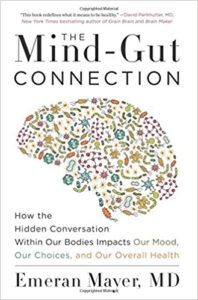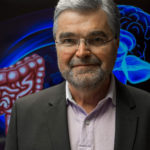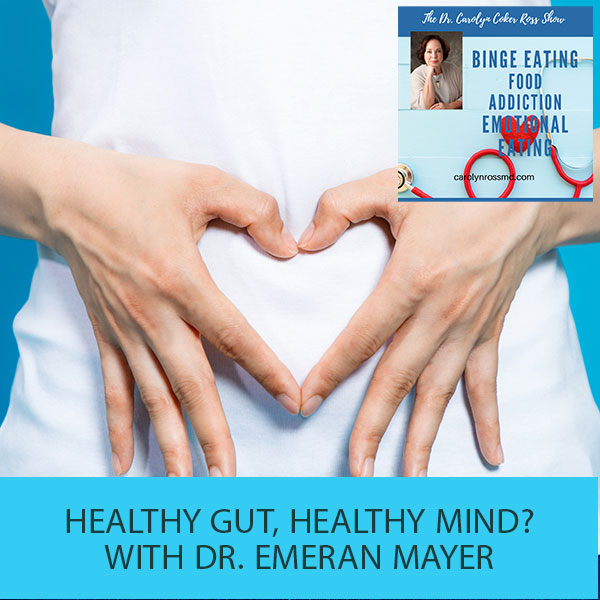
We have all experienced the connection between our mind and our gut – the decision we made because it “felt right,” the butterflies in our stomach before a big meeting, the anxious stomach rumbling when we’re stressed out. While the dialogue between the gut and the brain has been recognized by ancient healing traditions including Ayurvedic and Chinese medicine, Western medicine has failed to appreciate the complexity of how the brain, gut, and more recently, the microbiome – the microorganisms that live inside us – communicate with one another. Do the gut microbiota influence our brain and behavior? Why is a plant-based diet optimal for our microbes and for our health? What role does the mind play in our attitude towards food? These are just a few of the interesting questions Dr. Emeran Mayer discusses in this podcast as well as the revolution that is happening in medicine as we learn more and more about the influence of the gut microbiome on our behaviors, our thinking, and our health and wellness.
—
Listen to the podcast here:
Healthy Gut, Healthy Mind? with Dr. Emeran Mayer
How Gut Health Influences Brain Health And Behaviors
My guest is Dr. Emeran Mayer who is a gastroenterologist, neuroscientist and professor in the Departments of Medicine, Physiology and Psychiatry at the David Geffen School of Medicine at UCLA. He is the Executive Director of the G. Oppenheimer Center for Neurobiology for Stress and Resilience at UCLA and Co-Director of the CURE: Digestive Diseases Research Center. He is one of the pioneers in leading researchers in the role that the mind-brain-body interaction in health and chronic disease. He has a bestselling book called The Mind-Gut Connection, which was published in 2016 and has been translated into over twelve languages. Welcome to the show, Dr. Mayer.
It’s great to be on the show. Thanks for inviting me.
I have a few questions for you. This is a fascinating topic talking about the gut-brain connection, the gut microbiome and how that impacts all areas of our health. There have always been sayings in popular culture that hinted at this gut-brain connection and also certain medical conditions in which the gut influenced the brain such as irritable bowel syndrome and higher risk for depression. Why has it taken medicine and science so long to look into this?
I’ve worked my entire career in this area, the brain-gut connection. The microbiome came on later several years ago when the science in that area exploded. There’s been zero interest in medicine in this brain-gut connection until recently. The only way I can explain this is with this famous Cartesian split that was decided hundreds of years ago that the church deals with the mind and that science deals with the rest of the body. It’s interesting why this has been so prevailing. The model that I’ve always seen more than ever is that the brain is not an organ to generate psychological problems and feelings. It’s a supercomputer that runs our whole organism in a perfect way. It tries to coordinate everything inside the body and outside of the body. The reason that the gut is closely connected is not by coincidence because if you look at evolution, the first organisms, the first animals floating in the ocean where these tiny marine animals called the hydra, which was essentially floating digestive tubes with a nerve net around them. When they opened one end of this floating tube, food came in and then they had a peristaltic mechanism and left on the other end.
That’s similar to our digestive tract is what you’re saying.
It’s almost identical. It states from billions of years this design principle and only later did our main brain developed. The enteric nervous system is the blueprint for building our complex central nervous system.
When you’re talking about the enteric nervous system, you’re talking about the nervous system in the gut. Because I don’t think many people see the gut as part of the nervous system. Laypeople don’t necessarily see it that way.
[bctt tweet=”What if the gut brain is more important to your health than the brain?” username=”CarolynCRossMD”]We can’t see that and we can’t visualize it because it’s hidden. Even if you do an endoscopy, you wouldn’t see it because it’s sandwiched in between the muscle layers of the gut. There are two nerve nets. They’re interconnected. One does more with fluids secretion and the other one with the peristaltic reflex.
I want to get into something that people will understand why this is important. When you talk about this nervous system in the gut, some people refer to it as the second brain. The brain and that nervous system in our gut communicate back and forth. What are some of the ways in which a layperson could understand this important connection?
If you talk about the big brain and the gut-brain, the gut-brain can pretty much run all the essential functions for digestion by itself. It’s an autonomous system, clever and complicated. It can move backward and forwards when we vomit. Normally, it doesn’t need the input of our big brain. However, if something happens, when you get upset, stressed, depressed and anxious, the brain then sends signals down and changes the basic function of the gut’s nervous system.
For example, when people talk about having butterflies in their stomach, that’s one of the ways in which anxiety may influence the workings of the gut-brain or the small brain.
This is a good example that whenever you have an emotion in your brain, there’s always a mirror image of that emotion in your gut-brain and in your gut, even though you don’t notice it.
Anger, for example, how would that be mirrored in the gut?

The Mind Gut Connection
There are people that feel the anger in their gut and the brain sends down signals to cause strong vigorous contractions and spasms in the upper part of the stomach. Whereas with anxiety, there are different signals going down. This is not a general emotional response, but each emotion has its own pattern on how it changes the gut. This is what I always tell patients, when you have any emotion, just always remember the same thing that you perceive is happening at your gut level. You may feel it if you’re a sensitive person, but a lot of people don’t even feel it because they’re not even aware of it.
They’re not aware that it might be that way. They’re not aware that emotions can affect the gut. When we talk about the gut. There are a lot of talks about the microbiome. I know you work a lot with stress and resilience. How does the gut microbiome or the microbiome order affect the brain and our behavior?
Clearly, by directional communications. We talked about how the brain and the emotions can influence the brain of the gut, but it doesn’t stay with the gut. Anytime you have an emotion, it will change the transit time it takes for things to move through the gut, the blood flow, secretion and that will change the microbes as well. In addition, this stress mediating nerves that comes from our brain can directly talk to certain microbes and change their gene expression and their behavior. The microbes listen to our emotions. They are aware of what our emotions are.
Let’s say our brain is chronically disordered. For example, in the case of somebody who’s seriously depressed for long periods of time. That can go into the gut and cause epigenetic changes like turning on gene expression or turning it off. Is that what you mean?
We do know that quite a few microbes are gene expression pattern, particularly the virulence genes. How aggressive they are towards their host or how they interact with the host are turned on by norepinephrine, the main stress hormone that we secrete. It increases our heart rate, but it also talks to the microbes. If this is epigenetic, meaning permanently changing gene expression, that we don’t know. I personally always think that a lot of epigenetic changes happen early in life. Emotional influences of the developing brain could potentially cause long-lasting changes in gene expression patterns.
In the case of people who’ve had adverse childhood experiences, we know that that can cause long-lasting changes in the neurocircuitry in the brain. Does that also then cause changes in the gut?
I would expect so. We can’t prove that. We’ve done studies on the brain and on stress responsiveness. That’s pretty well established. My feeling is that there’s a similar effect that this early adversity exerts on events in the gut in the microbes. It will influence the composition in the first three years of life or the time when the microbial architecture community structure is established. If during that time there are major influences from the brain during adversity, that would affect that as well. It could affect the microbes in multiple levels, gene expression, epigenetics and also their composition and their community structure.
We do know that an adult who had experienced adverse childhood experiences, they’re more likely to have a host of medical conditions. Their risk for addictions, ADD, ADHD, eating disorders and obesity is increased. Let’s take obesity for example, because there are some studies showing that microbiome is different in people with obesity than in people without. Is that an example of how early life stress may have changed the microbiome and the microbiome may be part of why these conditions occur?
[bctt tweet=”Each emotion has its own pattern on how it changes the gut.” username=”CarolynCRossMD”]The microbiomes certainly play a role. This is clearly multifactorial influences. It starts in utero. People say that the first 1,000 days in life are the most crucial ones in terms of lifelong programming. That happens with what the kind of food that the mother eats during pregnancy, during breastfeeding, how the baby is born. All these factors interact in shaping the infant’s microbiome. Adversity, both for the pregnant mother as well as on the newborn certainly play a big role in this. There are several studies that it does affect the microbial composition and function. One particularly interesting study was done in mice. When the pregnant mother was mildly but chronically stressed with a sound several times a day, that affected the microbial composition of the newborn mice. If you think about what goes on for many pregnant women in terms of the refugees, even working women, female students or postdocs that have to finish their grant which is stressful even without being pregnant. They have to do it.
If the pregnant mice mother was stressed with the sound, then the baby’s microbiome is different. What implications might that have in humans in terms of what might show up in those babies later in life?
This could be a risk factor for a host of diseases. We talked about obesity, anxiety, maybe brain-gut diseases, an autism spectrum disorder that sounds even more complicated. You need the genetic predisposition, but it could well be that that the stress of the pregnant mother plays a role in that as well.
That’s almost revolutionary don’t you think?
It is and this is the exciting thing for me about the brain-gut microbiome science. It will change fundamental concepts the way we think about health and disease in a way that we have not thought about before.
Even just calling it brain-gut diseases instead of behavioral or brain diseases is revolutionary in a way.
Many of the psychiatrists are still skeptical because they never thought of it anything below the neck. Now you include the microbes in it, which is mind-blowing for them.

They’re going to need to come on board because the research is pretty compelling, wouldn’t you say?
Yes, particularly what we call the preclinical research, the studies done in mouse models. This is one problem with the field. We have phenomenally interesting data and results from these mouse models, but there are unlimited numbers of high-quality human studies that have confronted all this what you see in the mice can be translated into human disease. The reason for that is these human studies are much more expensive. You have to study ten mice in one condition or the other, but you have to study 1,000 patients. The budget goes into the multi-millions. People are not inbred, so they’re not genetically identical. Every human is different.
That makes it hard to come up with success.
We’re seeing strange things happening that we can’t explain. The obesity epidemic is something that came out of the blue and it continues to expand worldwide. Autism also increased. Another thing that’s happening is many of these diseases are now starting early in life. For example, colon cancer is another one that has almost something to do with the microbiome. Before, the main occurrence was in the late ‘50s, ‘60s. Now it starts in the ‘40s. It’s the same with obesity, we have an epidemic of childhood obesity. Things are going on which I personally think there’s a pretty good suspicion that the microbes and how we interact with it with our nutrition and diet play a big role in this.
Let’s talk about what we eat and how it affects the microbiome. Have there been changes in what we eat over the past many years that might be explaining the obesity epidemic beyond the whole, “Push away from the table and exercise more,” phenomenon?
There are some fundamental things that have happened. Since the end of World War II, the development of industrial-style agriculture, which plays significant role with all the implications, both in terms of how animals are raised, feed and treated with antibiotics. The same thing with these monocultures, the pesticides and the fertilizers killing the normal soil bacteria and interfering with this communication that the soil bacteria have with the plants. For a lot of people that may be the most dramatic thing that has happened with our nutrition. A three-fold change has happened, increase in fat, increase in sugar, decrease in fiber and the fourth one, increase in portion sizes. I think with those four you could explain a lot of what we are seeing.
What should people be eating in order to rehabilitate their microbiome, if that’s possible even?
[bctt tweet=”A lot of the food that we eat is covered with beneficial microbes, not pathogens.” username=”CarolynCRossMD”]You cannot recreate a microbiome. The real champions in microbiome health and diversity are people that live a few remaining hunter-gatherer tribes in Africa. They by far have the greatest diversity, which we take as an indicator of microbiome health. We can’t get back to that at the moment. There’s no way, no matter how healthy you eat, you will not reach that same diversity. You can get within a certain bandwidth to go from a low level to a higher level of diversity. The way to get there is fairly simple. If you think about all the things we’ve done to our food, it’s not been good for the microbes. Decreasing fiber deprives the microbes of their main natural food. If you increase the plant-based component of your diet, not with one vegetable, but with a whole variety of different types of vegetables.
The rainbow of vegetables as the dietitians call it.
The reason it’s important that we know because each plant has different types of fiber, polyphenols and antioxidants as thousands of these molecules. If you just eat one of those, it will not be sufficient. You will only feed one type of microbe.
You can’t just go buy an apple a day will keep the doctor away.
That won’t help. Even though, a very interesting paper has shown, when they looked at how many microbes are in an apple, it’s billions, which is interesting. People always talk about you have to take probiotic supplements. If you think about ingesting a billion highly diverse microbes, we need an apple or when you eat a piece of cheese. A lot of the food that we eat is covered with beneficial microbes, not pathogens.
Increasing the number of plants, fruits and vegetables in your diet is one thing. Can you do that while you are a big meat eater? You’re not going to suddenly become a vegan, which Dr. Ornish has shown help reduce the risk of heart disease. A lot of people are never going to be able to follow a vegan diet. Does it still help if you are eating may be less meat and increasing fruits and vegetables in your diet?
I have a couple of comments on this. Even though the trends are definitely in that direction, the vegans and vegetarians are definitely increasing in numbers amongst younger people. Decreasing the amount like if you go from red meat three times a day to once a week, that would be dramatic already. The other important thing is where does this meat come from? Because if these animals are artificially in some ways was corn-fed in a very unnatural way that they normally would not consume in nature, their meat, the fatty acids and the ratio of Omega-3 and Omega-6, the influence will be negative. If you eat grass-fed and grass-finished beef, that will have a less negative effect on your gut health and your gut microbiome health. The healthiest meat is a wild game.
Lamb and wild poultry, is that what you’re saying?
The bison, the American buffalo, these animals have been studied to have a much more favorable ratio of their fatty acids in it.
I used to live in Texas and my grandfather was a country doctor there. Often his patients would pay him with deer, venison meat or venison stew. As a child I ate a lot of venison, but I hardly know anyone now who eats or prepares venison.
It’s a problem that we have shifted. The cheapest and the easiest accessible meats are hamburgers and fast food. That’s the worst.
If you can eat a hamburger, you could use a bison burger.
You could have a bison burger. People eat this impossible burger or these plant-based burgers. They are plant-based 100%, but it’s highly processed food. I don’t know if that’s the way to go if you’re concerned about your gut health.
A word about sugar because sugar has become the new dietary villain in popular culture. We had don’t eat fat first and then didn’t eat carbohydrates and now it’s don’t eat sugar. Is sugar just a part of the picture?
[bctt tweet=”Making naturally fermented foods part of your long term diet is good for your gut.” username=”CarolynCRossMD”]Yes, sugar is a part of the picture. If you look at the preclinical studies in mice, 90% of it was done with high-fat diets. You can show all the negative effects that we see, systemic inflammation, with a high-fat diet. This is the standard experimental model.
What kind of fat are we talking about there?
There are unnatural diets. It’s 70% lard. Humans would not eat that diet. The science is out there. Sugar has equally negative effects, but it’s not just sugar. I’ve listened to some of these podcasts and in the media, there are all kinds of dietary gurus out there that said, “Your fat is good for you.” That has to be put into perspective. The total amount of fat is definitely not something you want to aim to maximize it. You also want to make sure where this fat is coming from. Plant fat is better than animal fat. This whole thing that we were all wrong about eating less fatty food is not totally correct.
I think there are a lot of popular diets, the Paleo diet, the Ketogenic diet that is all about just eat tons of meat.
I have two comments about that. One is it’s not good for you. It’s a fast way of losing weight. Yes, I totally agree. If you want to normalize your metabolic syndrome, have a quick change in your parameters. In the long-term, these are very unhealthy diets. They’re bad for your microbes. They starve your microbes, they’re the source of your main nutrients, and on top of all this, they’re bad for the environment. There’s a lot of discussions that with the continuously increasing world population, we’re not going to be able to maintain the meat consumption that we have in the past. The Paleo and the Keto people seem to have no consideration for the impact. The reason that half of the Amazon is burning is that they want to clear land for raising cattle that they sell to McDonald’s.
We’ve gotten ourselves in a pretty big pickle in terms of our diets and the environment being butting heads in that way. I wanted to ask you if you have any little steps that people can start to take. We talked about increasing the number of fruits and vegetables. Maybe being more careful about where you get any of the fat you eat. It’s not so much from animal sources, but more from olive oil, grape seed oil and those sources. Are there any other things? What about probiotics or eating foods that are fermented? Does that have a beneficial effect?
The science is not that strong. Generally used probiotics, Bifidobacterium and lactobacilli, there are a few studies that are well-designed. They seem to have a small beneficial effect on a variety of things. We don’t know exactly why that is. They don’t increase the diversity of your normal gut microbiome, but there’s evidence.
What about foods that are considered probiotic?
Naturally fermented foods, that’s what I recommend to my patients. Make that a regular part of your diet with key for yogurt, kimchi, kombucha, whatever you prefer. If you just do this for a certain amount of time, it’s a waste of your money and time. Anything with diet, you don’t want to go on a short-term diet. You want to go on a lifelong path. Whatever you do to improve your gut health and gut microbial health, you want to do for the rest of your life and you will pay particular attention when women that are pregnant and what they feed their young children. Probiotics, there will be a whole new dimension. Scientists are working on microbes that have specific benefits like short-chain fatty acid production.
needs to be more customizable if you would take a probiotic for a specific problem.
You would first do a test of your stool and you would identify exactly what microbes you are missing. We’re many years away from that. There are many hurdles to get to that point.
This has been a fascinating conversation. I have personally enjoyed talking with you because I think this is such an interesting topic and so revolutionary. I appreciate you taking the time to do this with me and hopefully maybe we can have you back again.
It was a pleasure to be on your show. Thank you very much.
Important Links:
- Oppenheimer Center for Neurobiology for Stress and Resilience
- CURE: Digestive Diseases Research Center
- The Mind-Gut Connection
About Dr. Emeran Mayer
 Emeran A Mayer is a Gastroenterologist, Neuroscientist and Professor in the Departments of Medicine, Physiology and Psychiatry at the David Geffen School of Medicine at UCLA. He is the Executive Director of the G. Oppenheimer Center for Neurobiology of Stress and Resilience at UCLA, and co-director of the CURE: Digestive Diseases Research Center. Dr. Mayer is one of the pioneers and leading researchers in the role of mind-brain-body interactions in health and chronic disease. Dr. Mayer is the author of the bestselling book “The Mind Gut Connection” which was published by Harper&Collins in July of 2016 and has been translated into twelve languages.
Emeran A Mayer is a Gastroenterologist, Neuroscientist and Professor in the Departments of Medicine, Physiology and Psychiatry at the David Geffen School of Medicine at UCLA. He is the Executive Director of the G. Oppenheimer Center for Neurobiology of Stress and Resilience at UCLA, and co-director of the CURE: Digestive Diseases Research Center. Dr. Mayer is one of the pioneers and leading researchers in the role of mind-brain-body interactions in health and chronic disease. Dr. Mayer is the author of the bestselling book “The Mind Gut Connection” which was published by Harper&Collins in July of 2016 and has been translated into twelve languages.








